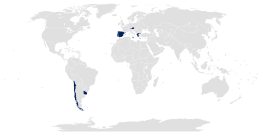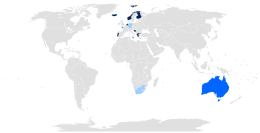Intersex rights in Mexico
In April 2018, Latin American and Caribbean intersex activists published the San José de Costa Rica statement, defining local demands.
[2] It documents the health and human rights situation facing intersex people in Mexico, and in the Latin American region more broadly, including societal taboos, incomprehension, unnecessary medicalization, and discrimination.
[7][8] In July 2018, the UN Committee on the Elimination of Discrimination against Women issued concluding observations on harmful practices, recommending that Mexico "explicitly prohibiting the performance of unnecessary surgical or other medical treatment on intersex children" until they can consent.
[4] Brújula Intersexual has also documented significant levels of poverty and disparities in access to health care based upon family wealth and income.
[10] Laura Inter has imagined a society where sex or gender classifications are removed from birth certificates and other official identification documents,[4] and Brújula Intersexual has called for a right to legal documentation with no obligation to state any gender, in a submission to a review of the Yogyakarta Principles.


